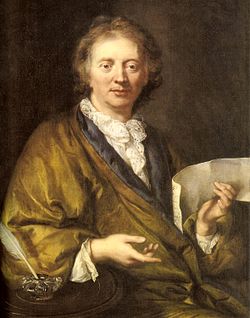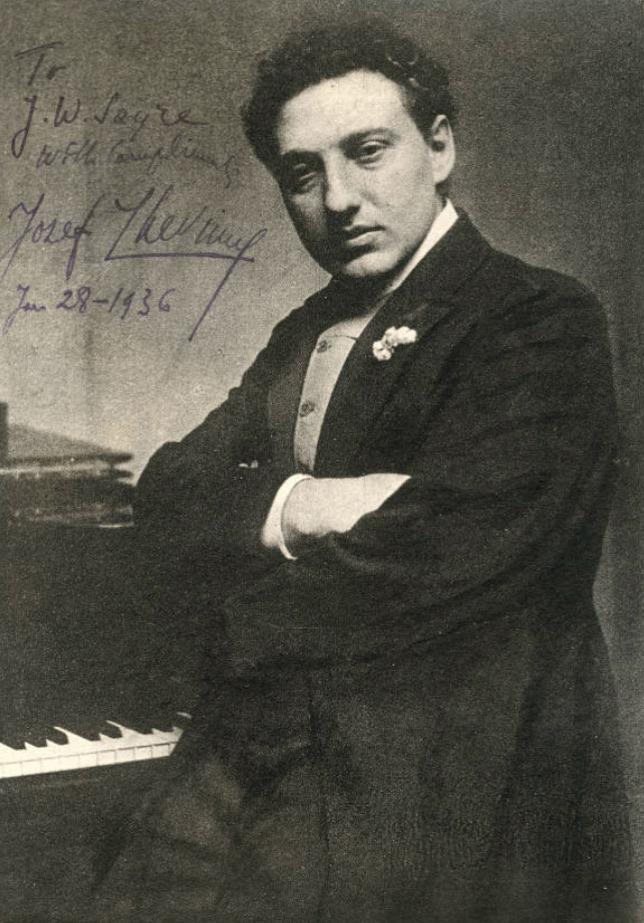This Week in Classical Music: November 8, 2021.Lhévinne and more. François Couperin, known as Couperin Le Grand because he was the greatest of many musicians in the Couperin family, and because he was one of the greatest French composers of the Baroque era, was born in Paris on November 10th of 1668.We’ve written about him many times, for example here.And here is the 25th Order (or Suite), from Book IV of his Pieces for the Harpsichord.The five sections of the Order are titled: La visionnaire, La misterieuse, La MonflambertI, La muse victorieuse, and Les ombres errantes.
Alexander Borodin, a chemist and fine composer, was born on November 12th of 1833.Here’s one of our entries on him.
Two years ago, we published an entry on two instrumentalists born that week; their anniversaries fall on this week as well.Read here about the pianist Daniel Barenboim and the cellist Natalia Gutman.
Josef Lhévinne, one of the greatest pianists of his generation, was born on December 13th of 1874 in the city of Oryol, Russia.Only Joseph Hofmann and Sergei Rachmaninov could be compared two him in virtuosity.Lhévinne graduated from the Moscow Conservatory the same year as Rachmaninov and Scriabin with the Gold Medal in the piano, ahead of both.In 1895 he received the first prize at the Anton Rubinstein piano competition in Berlin.In 1898 Lhévinne married his classmate, Rosina Bessie, who, as Rosina Lhévinne became famous as the teacher of Van Clyburn, James Levine, John Browning, Misha Dichter, and scores of other extremely successful pianists.For a while Josef taught at the Tbilis and then the Moscow conservatories.Josef and Rosina moved to Berlin in 1907; they often performed together, and both became known as excellent piano teachers.Even though Josef was a well-known person, he and Rosina were Russian citizens living in Germany.Once WWI started, they were interned as enemy citizens and Josef was banned from performing.In addition, after the 1917 Revolution they lost all of their savings they had left in Russia.Once the war was over, the Lhévinnes moved to the US.In 1924 Josef and Rosina joined the staff of the new Juilliard Graduate School.A retiring, and not ambitious person, Josef Lhévinne had a distinguished but rather small performance career; he also left few recordings.Here are two of Chopin’s etudes: op. 10, no 11 and op. 25, no. 6.They were recorded in 1935.
Also this week: Leonid Kogan, a wonderful Soviet violinist, was born on November 14th of 1924.Here’s an excerpt from the Grove Dictionary of Music’s article about him: “After David Oistrakh, Kogan was considered the foremost Soviet violinist, and one of the most accomplished instrumentalists of the day. Kogan’s approach, however, was more objective, less emotional than Oistrakh’s. His tone was leaner, his vibrato tighter, his temperament cooler and more controlled. His intonation was pure and his technical mastery absolute.”Very well put.Here Kogan plays Fritz Kreisler’s Caprice Viennois, Op. 2.The recording was made in New York in 1958.
Josef Lhévinne, 2021
This Week in Classical Music: November 8, 2021. Lhévinne and more. François Couperin, known as Couperin Le Grand because he was the greatest of many musicians in the Couperin family, and because he was one of the greatest French composers of the Baroque era, was born in Paris on November 10th of 1668. We’ve written about him many times, for example here. And here is the 25th Order (or Suite), from Book IV of his Pieces for the Harpsichord. The five sections of the Order are titled: La visionnaire, La misterieuse, La MonflambertI, La muse victorieuse, and Les ombres errantes.
family, and because he was one of the greatest French composers of the Baroque era, was born in Paris on November 10th of 1668. We’ve written about him many times, for example here. And here is the 25th Order (or Suite), from Book IV of his Pieces for the Harpsichord. The five sections of the Order are titled: La visionnaire, La misterieuse, La MonflambertI, La muse victorieuse, and Les ombres errantes.
Alexander Borodin, a chemist and fine composer, was born on November 12th of 1833. Here’s one of our entries on him.
Two years ago, we published an entry on two instrumentalists born that week; their anniversaries fall on this week as well. Read here about the pianist Daniel Barenboim and the cellist Natalia Gutman.
Josef Lhévinne, one of the greatest pianists of his generation, was born on December 13th of 1874 in the city of Oryol, Russia. Only Joseph Hofmann and Sergei Rachmaninov could be compared two him in virtuosity. Lhévinne graduated from the Moscow Conservatory the same year as Rachmaninov and Scriabin with the Gold Medal in the piano, ahead of both. In 1895 he received the first prize at the Anton Rubinstein piano competition in Berlin. In 1898 Lhévinne married his classmate, Rosina Bessie, who, as Rosina Lhévinne became famous as the teacher of Van Clyburn, James Levine, John Browning, Misha Dichter, and scores of other extremely successful pianists. For a while Josef taught at the Tbilis and then the Moscow conservatories. Josef and Rosina moved to Berlin in 1907; they often performed together, and both became known as excellent piano teachers. Even though Josef was a well-known person, he and Rosina were Russian citizens living in Germany. Once WWI started, they were interned as enemy citizens and Josef was banned from performing. In addition, after the 1917 Revolution they lost all of their savings they had left in Russia. Once the war was over, the Lhévinnes moved to the US. In 1924 Josef and Rosina joined the staff of the new Juilliard Graduate School. A retiring, and not ambitious person, Josef Lhévinne had a distinguished but rather small performance career; he also left few recordings. Here are two of Chopin’s etudes: op. 10, no 11 and op. 25, no. 6. They were recorded in 1935.
1874 in the city of Oryol, Russia. Only Joseph Hofmann and Sergei Rachmaninov could be compared two him in virtuosity. Lhévinne graduated from the Moscow Conservatory the same year as Rachmaninov and Scriabin with the Gold Medal in the piano, ahead of both. In 1895 he received the first prize at the Anton Rubinstein piano competition in Berlin. In 1898 Lhévinne married his classmate, Rosina Bessie, who, as Rosina Lhévinne became famous as the teacher of Van Clyburn, James Levine, John Browning, Misha Dichter, and scores of other extremely successful pianists. For a while Josef taught at the Tbilis and then the Moscow conservatories. Josef and Rosina moved to Berlin in 1907; they often performed together, and both became known as excellent piano teachers. Even though Josef was a well-known person, he and Rosina were Russian citizens living in Germany. Once WWI started, they were interned as enemy citizens and Josef was banned from performing. In addition, after the 1917 Revolution they lost all of their savings they had left in Russia. Once the war was over, the Lhévinnes moved to the US. In 1924 Josef and Rosina joined the staff of the new Juilliard Graduate School. A retiring, and not ambitious person, Josef Lhévinne had a distinguished but rather small performance career; he also left few recordings. Here are two of Chopin’s etudes: op. 10, no 11 and op. 25, no. 6. They were recorded in 1935.
Also this week: Leonid Kogan, a wonderful Soviet violinist, was born on November 14th of 1924. Here’s an excerpt from the Grove Dictionary of Music’s article about him: “After David Oistrakh, Kogan was considered the foremost Soviet violinist, and one of the most accomplished instrumentalists of the day. Kogan’s approach, however, was more objective, less emotional than Oistrakh’s. His tone was leaner, his vibrato tighter, his temperament cooler and more controlled. His intonation was pure and his technical mastery absolute.” Very well put. Here Kogan plays Fritz Kreisler’s Caprice Viennois, Op. 2. The recording was made in New York in 1958.